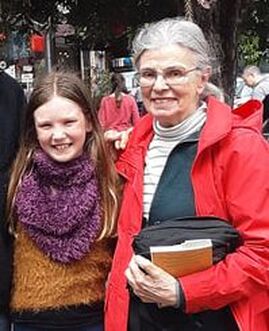The Wisdom of Youth
This page is dedicated to the young people who will inherit the environmental challenges
that previous generations created.
This page is dedicated to the young people who will inherit the environmental challenges
that previous generations created.
|
To anyone who cares to read this,
By Sydney Fair, 11 I would like to give you some advice. This advice will be about our planet. I ask for you to at least think about what I’m saying, and not just dismiss it with a wave of your hand and a thought of “Oh, that’s nice, but it doesn’t apply to me.” But it does. Every single thing concerning Earth applies to you and me and all of humanity. So, with that thought in mind, read on. Earth’s story started 4.6 billion years ago, as a big ball of lava and steam. It was so hot that even liquid water couldn’t form. 1.1 billion years after that, the first life evolves! For a couple billion more years, life evolved little by little, bit by bit, with various major extinctions and evolutions. If you want an example, take the dinosaurs. They were at the top of the world, so to speak, for 180 million years! They were at the very top of the food chain and just flat-out scary. But then, something happened and they all went extinct. All of that glory and power, gone in an instant. You may see where I’m going with this. Anyway, after the dinosaurs died off, mammals took over. For about 64 million years, nothing too momentous happened. But then, boom, homo habilis. (Okay, this is so exciting it needs a whole different paragraph) The homo habilis! The first of the modern human line! Yes, the evolution of the homo habilis was quite exciting indeed. Then, they died but another species of the homo genus continued their legacy. And that pattern repeated, well, a lot. Specifically, it repeated until now, when the homo sapiens, or humans rule the world. Now, that’s what I really want to talk about: us. For the mere 200,000 years that we’ve lived on this planet, we’ve changed it so much. One can now fly around the entire world in less than two days, and fly to the moon, no less! We can also talk to someone miles away from us and see animals at the zoo for fun that before would eat us. Now, all those are relatively good changes, but then we think about this: According to www.theworldcounts.com, “Since 2016, an average of 28 million hectares have been cut down every year. That’s one football field of forest lost every single second around the clock.” One entire football field! In one second! And that’s not to mention all the CO2 in the atmosphere causing temperatures to increase causing ice to melt, ocean levels to rise, so many animals to die… And that’s my point-we are killing the earth and everything on it. Yes, including us. Indirectly, but that definitely still counts. Homo sapiens have lived, so far, in only a fraction of Earth’s existence, around 0.004%. And in that miniscule bit of time, we have altered our planet drastically, and not all in good ways. A lot of sci-fi books introduce this point too. For example, a classic, The Blade Runner. In this world, it’s a treasured prize and privilege to have a real, living animal, because practically all living animals have had their habitats destroyed or been considered pests and killed. So far, that’s not seeming too far off! If we keep going at this rate, Earth will just be a barren wasteland soon. So I guess my advice is this: Stop this while we still can, before this stops us. Sincerely, Sydney |

Syndey Fair, center, with her grandmother Abbie Fair, retired ANJEC water resources director
To use her time productively during the pandemic stay-at-home order, 6th grader Sydney Fair created a timeline for earth, recording the different periods on sheets of printer paper and attaching them around the walls of her home next to the ceiling.
Then her teacher gave this assignment to Sydney's class: "Tap into your own wisdom and give advice to someone—it could be someone you know personally, a historical figure, or a famous person alive today. Write for 15 minutes and identify the person and the advice that you would give. Choose a familiar subject so that you can provide details and elaboration that explain WHY this person needs your advice." |

